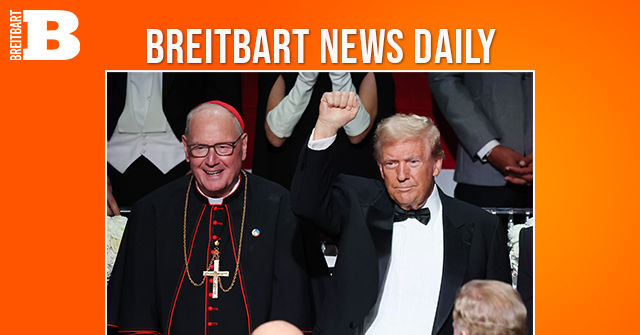In a recent discussion on the 2024 presidential race, Breitbart Editor-in-Chief Alex Marlow joined host Mike Slater to analyze the political landscape. They reflected on former President Donald Trump’s engaging performance at the Al Smith Dinner, an event designed to raise funds for Catholic charities in the Archdiocese of New York. With the tradition of presidential candidates maneuvering through a comedic roast of one another, Trump captivated the audience with his charm and wit, generating significant applause. In contrast, Vice President Kamala Harris’s decision to skip this prominent event was sharply criticized, indicating a potential misstep in her campaign strategy.
Marlow emphasized the significance of Trump’s appearance at the dinner, noting that the event allows candidates to showcase their personality and humor, which can resonate well with voters. Trump’s ability to connect with the Catholic community through a light-hearted yet impactful speech suggests a strategic advantage as the election approaches. The laughter and applause he received not only demonstrate his enduring popularity but also his commitment to engaging with varied voter bases, a crucial element for any successful campaign in the highly competitive election season.
On the other hand, Marlow’s analysis of Harris’s absence from the Al Smith Dinner painted a different picture. He interpreted her snub as reflective of her broader challenges in attracting support from diverse demographic groups, particularly veterans of the Democratic Party. Harris’s decision to forego a chance to connect with a significant segment of voters revealed a significant tactical gap and raised concerns about her ability to galvanize support as the election nears. This absence could potentially foreshadow her struggles in the 2024 election, casting doubt on her viability as a candidate.
As they continued their conversation, Marlow and Slater discussed the dynamics of humor in political campaigning, reiterating its importance. They highlighted how well-crafted jokes can break the ice and make candidates appear more relatable to the electorate. Trump’s successful delivery at the Al Smith Dinner stood in stark contrast to the often serious and scripted nature of contemporary political speeches. Marlow suggested that candidates who can effectively utilize humor in their campaigns may have an edge in connecting with voters, ultimately influencing polling outcomes and electoral success.
Furthermore, Marlow also touched upon the implications Harris’s decision might have on the Democratic Party’s bigger picture. The decision could be interpreted as a possible disengagement from key voter groups, which poses a risk as party unity becomes paramount in the face of a formidable Republican contender. Moreover, the perceived aloofness could alienate voters who appreciate candidates engaging in traditional political rituals, which often symbolize approachability and connectivity. Marlow’s insights hint at the potential ramifications for both Harris and the Democratic Party strategy heading into the crucial months leading up to the election.
In conclusion, Marlow and Slater’s discussion shed light on the evolving narrative of the 2024 presidential race. Trump’s reaffirmed ability to engage with voters through humor and charm contrasts sharply with Harris’s strategic misstep, indicating a potential imbalance in momentum as the candidates gear up for the upcoming electoral combat. Both the evening’s speeches and the candidates’ attendance—or lack thereof—at traditional events highlights the importance of not just policy, but personal connection in today’s political arena. As the race progresses, the ability to connect, engage, and resonate with voter sentiments will undoubtedly play a significant role in determining the ultimate victor in the upcoming election.

